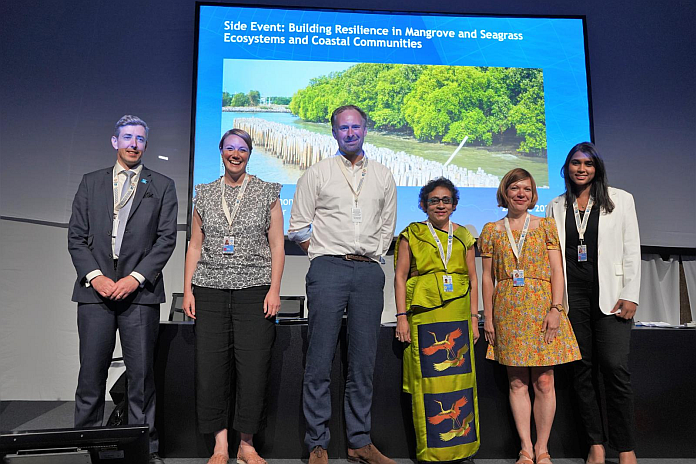ENGLAND / ANTIGUA – Antigua and Barbuda has announced its intention to join the Commonwealth Blue Charter Action Group on Mangrove Ecosystems and Livelihoods, emphasising that the coastal forests are vital to mitigating and building resilience to the harmful impacts of climate change.
Speaking at an official side event organised by the Commonwealth Secretariat at the United Nations Oceans Conference in Lisbon this week, the minister of social transformation, human resource development and the blue economy of Antigua and Barbuda, Dean Jonas, underscored the crucial role of mangroves and seagrass in building climate resilience in ocean states in the Caribbean.
“Conserving and restoring mangroves is essential to fighting climate change. The warming of the global climate, fuelled by increased carbon emissions, is already having disastrous effects on communities worldwide,” he said.
“A world without mangroves would likely mean a world with fewer species of fish, more coastal damage and unknown ecosystem and public health consequences related to changes in pollutants, sediments and carbon cycles. “In Antigua and Barbuda, we aim to participate in efforts to help restore wetlands and neighbouring marine communities and thus bring them to a state of better resilience against climate change and other negative events.”
Jonas formally expressed his government’s interest in joining the Mangrove Ecosystems and Livelihoods Action Group (MELAG). Chaired by Sri Lanka, it is one of ten action groups under the Commonwealth Blue Charter – an agreement by all 56 members of the Commonwealth to work collaboratively to tackle global ocean challenges.
“We fully believe that joining this Action Group would provide us with a lot of valuable insight and knowledge and we are aware of the utmost importance of Commonwealth collaboration in achieving important targets and goals,” said Jonas.
The Commonwealth Blue Charter Action Groups are made up of like-minded countries who rally together to share solutions, strategies and information and support joint initiatives. Countries volunteer to ‘champion’ the action group, coordinating activities and leading advocacy, with the support of the Commonwealth Secretariat.
“When we formed MELAG we did not want to talk about mangrove conservation without talking about people. People are part of the mangrove ecosystem and it is vital that local coastal communities are engaged and included at all levels of the conservation process. That’s what sustainable development is all about,” said ambassador Hasanthi Dissanayake, acting additional secretary for ocean affairs, environment and climate change, ministry of foreign affairs, Sri Lanka.
Ambassador Dissanayake took part in a panel discussion which followed the minister’s remarks, along with the joint head of international sustainable blue finance at the UK’s department for environment, food and rural affairs Briony Coulson, programme specialist at the Intergovernmental Oceanographic Commission (IOC) of UNESCO Dr Kirsten Isensee, development director of the Blue Marine Foundation Dan Crockett and youth representative and Incoming André Hoffmann Postdoctoral Fellow, Stanford Center for Ocean Solutions, Dr Josheena Naggea.
The session was moderated by the head of Oceans and Natural Resources, Commonwealth Secretariat, Dr Nicholas Hardman-Mountford.
Panellists discussed the role of mangrove ecosystems as a nature-based solution for climate change, given its powerful capacity to absorb and store carbon from the atmosphere.
Measuring and monetising this capacity gives rise to a potential ‘blue carbon market’ where coastal communities can trade ‘carbon credits’, benefitting from mangrove forests, while also building climate resilience. The panel emphasised the need for blue carbon markets to be sustainable, transparent and equitable, integrating local coastal communities into all levels of discussion, from the design phase to governance and decision-making.




